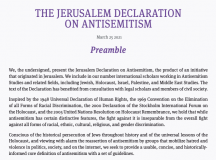Gerald N. Izenberg is Prof. Emeritus of History at Washington University in St. Louis. He argues that the Jerusalem Declaration fails to consider the distinction between Jewish and non-Jewish criticisms of Israel. Though this is an uncomfortable distinction for many Jews to entertain as it seems to violate every egalitarian and universalist impulse, when it comes to antisemitism it is morally unavoidable.
There is a very large yet somehow invisible animal in the room when it comes to discussion of the recently published Jerusalem Declaration on Antisemitism. Why it was invisible to the drafters and signers of the declaration is itself an interesting question. To some, perhaps, its presence may have been too dangerous to acknowledge, to others it might have seemed a breach of civility; better to act as if it’s not there. But many signers, I suspect, simply didn’t see it because of who they are and who the declaration is actually addressed to.
As the signers explicitly announce, the central purpose of the declaration is to replace the ‘working definition’ of anti-Semitism adopted by the International Holocaust Remembrance Alliance in 2016. The issue that prompted them to produce their alternative definition is the relationship between anti-Zionism and antisemitism. Though they do not say so directly, referring only to the ‘lack of clarity of key points’ in the IHRA definition and the ‘confusion and general controversy’ it has produced, the Jerusalem signers clearly believe it too easily allows conflation of criticism of Israel with antisemitism. It therefore poses a serious danger to the free speech of critics of Israel wherever it is adopted, whether by universities or by government resolutions pertaining to universities, the home of virtually all the signers.
The critical thrust of the Jerusalem Declaration is obvious from its structure. It is divided into three sections. Section A, labeled ‘General,’ lists standard, universally acknowledged historical examples of antisemitic positions that have nothing to do with Israel. Sections B and C deal exclusively with the Israel/Palestine situation. Section B lists five positions that are antisemitic ‘on the face of it,’ while C also lists five, in somewhat greater detail, that are not antisemitic on the face of it. The force of the expression ‘on the face of it’ is to stress the self-evidence of the designation, and to exclude the possibility that any of these positions could somehow be qualified or redescribed in such a way as to no longer be ‘antisemitic’ (in the case of B) or ‘not antisemitic’ (in the case of C) Thus, there is no way of using classical antisemitic tropes in describing Israeli policy or behavior that would not be antisemitic (6). Similarly, there is no context in which ‘opposing Zionism as a form of nationalism’ (12) or applying ‘double standards’ to Israel (15) is antisemitic.
It is hardly conceivable that anyone the declaration is meant to address will object to the items in B. In any case there has not been any serious controversy about them among that audience. But a few items in C are indeed matters of intense and bitter contemporary controversy. The obvious intent of the Jerusalem declaration is to clear those items, and the critics of Israel who employ them, from the charge of antisemitism. If, however, the point of any attempt to define antisemitism in the first place is at least in part to help defend Jews by identifying their enemies, that is, anti-Semites, the declaration misses the mark in a dangerous way.
What it utterly fails to consider is that there is a crucial distinction to be made between Jewish and non-Jewish criticism of Israel. Positions that are not antisemitic for those who identify as Jews may well be antisemitic when held by non-Jews. This is a very uncomfortable distinction for many Jews to entertain; it seems to violate every egalitarian and universalist impulse. But when it comes to antisemitism making such a distinction is morally unavoidable.
How Judaism and Jewishness are defined is not simply an empirical-historical question but a normative one, and normative positions on what Judaism or Jewishness is and requires are appropriate only for those who identify as Jews. The philosopher Alasdair MacIntyre, pointing to the internal contestation that inevitably marks all traditions, amusingly but quite seriously claims that membership in a tradition is defined not by any one set of beliefs but by one’s desire to participate in the argument about what the tradition is, what it obligates one to do and believe. Those who don’t identify by participation, however, have no standing in it and no right to define its meaning for those who do. And, I would add, it is presumptuous, demeaning and a fundamental failure of recognition for those who don’t identify to do so.
It is not antisemitic for Jews who affirm Judaism as a religion but deny it is a nationality, or for ‘universalist’ Jews who in the name of prophetic Judaism reject all nationalism, to be anti-Zionist, any more than it is antisemitic for Haredim to insist that Israel is illegitimate because it was not brought into being by the Messiah. Nor is it antisemitic for Jews to hold Israel to higher standards than other states because they think that from the standpoint of Jewish values ‘being like all the nations’ is not good enough. That these positions are not antisemitic does not preclude criticising them as historically wrong, radically unrealistic, or morally noxious. But for non-Jews to deny Jewish self-definition as a nationality and the consequent right to national self-determination, to focus exclusively on Israel wrongdoing, to make more stringent demands on Israel than on other states, and a fortiori to work for the destruction of Israel is prima facie antisemitic.
That proposals like the bi-national or unitary state have dire implications for Israeli Jews certainly raises serious questions about meaning of Jewish support for such an idea. The same week the Declaration came out, one of its signers, James Loeffler, in a review of Eric Weitz’s book A World Divided: The Global Struggle for Human Rights in an Age of Nation States, pointed out, yet again, what most observers of the Israeli-Palestinian conflict acknowledge: a ‘post-national reconfiguration’ of Israel/Palestine that does not recognise Israeli and Palestinian national aspirations is not only a utopian fantasy, since most on both sides ardently don’t want it, but given the demographics, would mean disaster for Israeli Jews if it were somehow forced on them. That poses, or should pose, a dilemma for anti-Zionist Jews who identify with Judaism: how, in practical terms, do they concern themselves with the fate of the largest Jewish community in the world? But that is of little or no concern non-Jewish anti-Zionists, and that is precisely what makes their position antisemitic.
Derek Penslar, another of the Declaration’s signers explicitly acknowledged in a Facebook posting discussing the JD, what is implicit but obvious about its purpose: it is a shot in an in-house war between Jews about Israel. I suggest that this internal Jewish battle should not be fought out through what purports to be a general definition of antisemitism. Fighting an intra-Jewish quarrel in that more general context seriously muddies the definition. Labelling positions like the double standard and the end of Israel as a Jewish state without qualification as not ‘on the face of it antisemitic’, without consideration of who is taking those positions or in what context, gives cover to some who truly are.







































